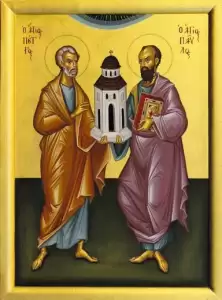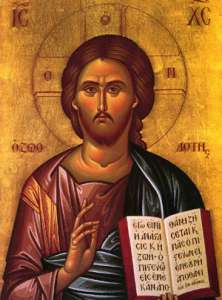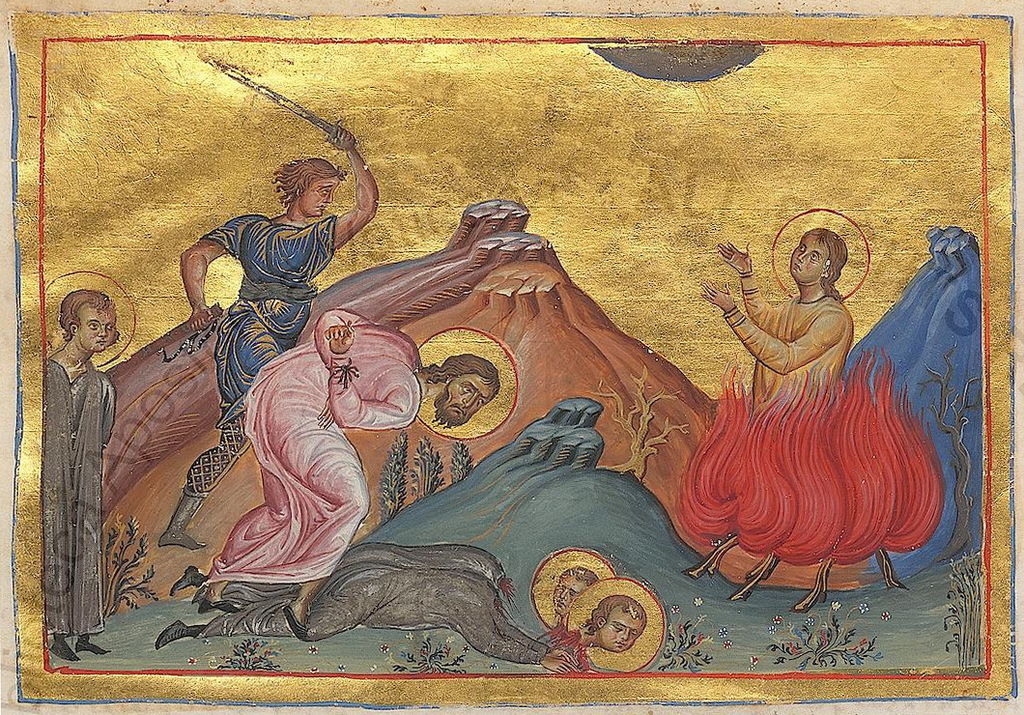Warning: Undefined array key "margin_above" in /home/stscahvallejo/public_html/wp-content/plugins/ultimate-social-media-icons/libs/controllers/sfsiocns_OnPosts.php on line 652
Warning: Undefined array key "margin_below" in /home/stscahvallejo/public_html/wp-content/plugins/ultimate-social-media-icons/libs/controllers/sfsiocns_OnPosts.php on line 653
It is folly to abstain all day from food but fail to abstain from sin and selfishness.
St. John Chrysostom
For Sunday, November 13
 Epistle Reading
Epistle Reading
The reading is from St. Paul's Letter to the Hebrews 7:26-28; 8:1-2
Brethren, it was fitting that we should have such a high priest, holy, blameless, unstained, separated from sinners, exalted above the heavens. He has no need, like those high priests, to offer sacrifices daily, first for his own sins and then for those of the people; he did this once for all when he offered up himself. Indeed, the law appoints men in their weakness as high priests, but the word of the oath, which came later than the law, appoints a Son who has been made perfect for ever. Now the point in what we are saying is this: we have such a high priest, one who is seated at the right hand of the throne of the Majesty in heaven, a minister in the sanctuary and the true tent which is set up not by man but by the Lord.
Christ is superior
One of the main themes of The Epistle to the Hebrews is to encourage the early Jewish Christians to persevere in their faith and belief in Jesus Christ as the awaited Messiah and not give into the pressure of returning to Judaism. Some had returned entirely to their Jewish roots, partly because of a low view of Jesus. The main themes of the letter are the superiority of Christ and His sacrifice over Judaism, and encouragement to continue in the Christian faith. Jesus is superior to the prophets, angels, Moses and Aaron. He is the true High-Priest, and offers a sanctuary and sacrifice in and of himself; and the entrance into heaven for those who worship Him.
As we come to know Christ and His works in our own lives, we must stand firm and never reject God's grace. We serve and please Him through participation in His once-for-all- sacrifice, tasting of the heavenly gift, sharing in the Holy Spirit. The Christian life is one of faith, love, and good works. (From the Orthodox Study Bible)
Reflection
We may not be tempted to return to another religion as the early Jewish Christians were. But we are often tempted to return to our former bad habits and sins. Those old habits and passions of anger, greed, lust, envy, pride, etc. can lurk hidden for a long time and then suddenly explode again, leaving us in despair and frustration. This often occurs when we either lapse in our struggle in prayer, fasting and good works, or when we start being proud of our spiritual efforts, or because our common enemy the Evil one is attacking us more severely in order to stop our progress. But God wants us to keep up the struggle and not let our guard down. The ultimate goal is to acquire humility. We must stay fully committed to Christ in times of testing, temptation and doubt. This constant reaffirmation of our faith in and love for Jesus will help strengthen our bond and personal relationship with him.
 Gospel Reading
Gospel Reading
Luke 10:25-37
At that time, a lawyer stood up to put Jesus to the test, saying, "Teacher, what shall I do to inherit eternal life?" He said to him, "What is written in the law? How do you read?" And he answered, "You shall love the Lord your God with all your heart, and with all your soul, and with all your strength, and with all your mind; and your neighbor as yourself." And he said to him, "You have answered right; do this, and you will live."
But he, desiring to justify himself, said to Jesus, "And who is my neighbor?" Jesus replied, "A man was going down from Jerusalem to Jericho, and he fell among robbers, who stripped him and beat him, and departed, leaving him half dead. Now by chance a priest was going down that road; and when he saw him he passed by on the other side. So likewise a Levite, when he came to the place and saw him, passed by on the other side. But a Samaritan, as he journeyed, came to where he was; and when he saw him, he had compassion, and went to him and bound up his wounds, pouring on oil and wine; then he set him on his own beast and brought him to an inn, and took care of him. And the next day he took out two denarii and gave them to the innkeeper, saying, 'Take care of him; and whatever more you spend, I will repay you when I come back.' Which of these three, do you think, proved neighbor to the man who fell among the robbers?" He said, "The one who showed mercy on him." And Jesus said to him, "Go and do likewise."
All human beings are your neighbor
After the Savior praised him, the lawyers pride and arrogance knew no bounds. That is why he said, And who is my neighbour? that is, "Who is close to me?" He imagined himself to be righteous and thought that there was no one like him and that no one could come close to him in virtue. He imagined that a righteous man could have as "neighbor" only another righteous man. Therefore wanting to show himself to be righteous and superior to all men, he says haughtily, And who is my neighbour?
But the Saviour as Maker of all, knowing that all men are one creation, defines neighbour not according to deeds or merits, but according to human nature. "Do not think," He says, "that just because you are righteous, no one is like you. All mankind shares the same nature and thus all men are your neighbors. Therefore, you too must be a neighbor to them and be near to all, not by location, but by the disposition of your heart and by your care for others. Therefore I present to you a Samaritan as an example, to show you that no matter how different or foreign he may have seemed, he was the neighbor of the one in need of mercy. You also must show yourself to be a neighbor by your compassion, and even unasked you must go to the help of others." Thus we learn from this parable to be always ready to show mercy and to make haste to be near those in need of our help.
But this parable also teaches us the goodness of God towards man. It was our human nature that was going down from Jerusalem, that is, was descending from tranquillity and peace, for Jerusalem means vision of peace. Where was man descending? To Jericho, a place sunk down low and suffocating with heat, that is, to a life of passions. See that He did not say, "went down," but, was going down. For fallen human nature is always inclined downwards, not just once of old, but continuously going down towards passionate life. And man fell among thieves, that is, among demons. For if a man did not come down from that high place where the spiritual mind rules, he would not fall among demons who strip the man, depriving him of his raiment of virtue, and then inflict the wounds of sin.
The demons strip us of every good thought and of Gods protection, and when we are thus naked, they lay on the stripes of sin. They leave human nature half dead, that is, with a mortal body and an immortal soul. And human nature was left only half dead in the further sense that man did not lie completely in despair, but hoped to find salvation in Christ. Human nature had not yet been slain outright; though death had entered the world through Adams transgression, death was soon to be abolished by the righteousness of Christ.
St. Theophylact of Ochrid
Questions:
- What keeps us from loving our neighbor?
- What are some ways you can be like the Good Samaritan this week?

Martyrs Antoninus, Zebinas, Germanus, Nicephorus and Manetha of Caesarea
In the third century, Emperor Maximian proclaimed that everyone must sacrifice to idols and eat from the sacrifices. He also commanded that everything sold in the marketplace be sprinkled with the blood of sacrifices. This order offended even the heathens. When the governor Firmilian was offering sacrifice to the idols, Antoninus, Zebinas, Germanus, and Nicephorus rushed in. They told him to abandon this error, "For there is no other God but one, the Maker and Creator of all things." When Firmilian asked who they were, they confessed they were Christians. Filled with wrath, the governor sentenced them to death. The courageous virgin Manetha was dragged to the cruel judge, Maxys, who stripped her naked and had her carried through the city while being tortured with straps. Then they took her to the governor, and she delivered a noble testimony of her Christian faith. Afterward, she was burned alive. The Christians were not permitted to take away the dead bodies for burial, and the governor set a guard to watch over the martyrs. The wild beasts, dogs, and birds tore the flesh of the martyrs to pieces. Entrails and limbs were scattered about the city, and there was great sorrow even from the idol-worshippers. Finally, on a clear day, drops of tears fell from the columns of the porticos throughout the city. The earth was wet in the marketplaces and streets, and not a drop of rain had fallen. Everyone said that the stones shed tears, and the ground wept for the senseless deeds.
Why do we light candles before the icons of the saints?
The candles lit before icons of saints reflect their ardent love for God for Whose sake they gave up everything that man prizes in life, including their very lives, as did the holy apostles, martyrs and others. These candles also mean that these saints are lamps burning for us and providing light for us by their own saintly living, their virtues and their ardent intercession for us before God through their constant prayers by day and night. The burning candles also stand for our ardent zeal and the sincere sacrifice we make out of reverence and gratitude to them for their solicitude on our behalf before God.
+ St. John of Kronstadt
How to learn to enjoy fasting
Fasting will not bring you joy if you take on an overwhelming burden. Do not pretend to be a saint or someone you are not. Do not put on an act, but be yourself. Then you will be able to take on the load according to your condition, feelings and situation.
God does not need our pretense and external false deeds, He needs our honest heart.
The discrepancy between our internal state and external actions and the image we create leads to mental dissonance, which, in turn, leads to despondency and depression.
The load should be increased gradually, preferably under the guidance of a priest. It is better to agree in advance with the priest who knows you on all the purely personal deeds that you wish to do. And be sure to assess them according to your own strength. This will teach you a lesson in humility, without which fasting is meaningless.
Humility is what brings us real joy. And if there is no joy during fasting, there is no humility in us. (Source: Orthodox Life)
Thank you for participating in SOFIA! If you've subscribed to our newsletter, look for an email notification next week when a new lesson page is posted. See you Sunday!

 Weekly catechism and spiritual devotion for the Orthodox home
Weekly catechism and spiritual devotion for the Orthodox home